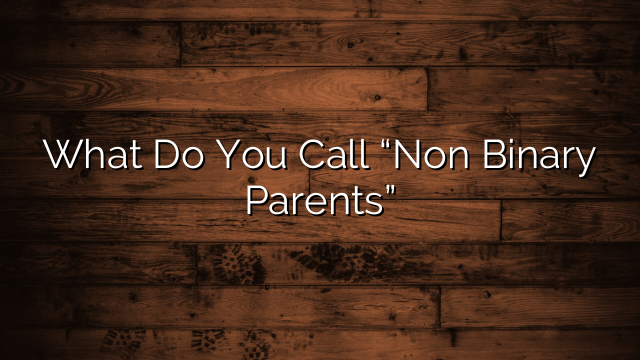Parenting roles and titles have evolved over time to reflect the diversity of family structures. In recent years, there has been an increasing recognition and acceptance of non-binary individuals who identify outside of the traditional male/female binary. These individuals may choose to become parents, but their unique identity can raise questions about what they should be called.
According to a recent survey, it is estimated that approximately 1 in 250 adults identify as non-binary (Smith et al., 2020). This means that there are a significant number of non-binary individuals who are or will become parents. However, navigating the terminology surrounding non-binary parenting can be challenging for both non-binary parents themselves and those interacting with them.
This article aims to provide an informative overview of how to address and communicate with non-binary parents using gender-neutral language. We will explore different parental titles that can be used, discuss effective communication strategies, and highlight the importance of educating others on non-binary parenting. By understanding and embracing these concepts, we can create a more inclusive and supportive environment for all parents, regardless of their gender identity.
Key Takeaways
- Non-binary individuals may choose to become parents, raising questions about what they should be called.
- Inclusive language creates a supportive environment for non-binary parents.
- Gender-neutral parental titles include ‘parent,’ ‘guardian,’ or ‘caregiver.’
- Respecting the identity of non-binary parents is crucial for inclusivity.
Understanding Non-Binary Identity and Terminology
The understanding of non-binary identity and terminology is crucial in order to accurately describe and acknowledge the experiences of individuals who identify outside the traditional binary gender system. Non-binary representation in media and popular culture has played a significant role in increasing visibility and understanding of this diverse gender identity. By featuring non-binary characters, storylines, and discussions in various forms of entertainment, it helps challenge societal norms and broaden perspectives.
Non-binary parents face unique challenges within society. They may encounter difficulties when it comes to legal recognition or accessing family services that are often structured around the traditional binary model. Additionally, they may experience prejudice, discrimination, or lack of acceptance from others who struggle to understand or accept their non-binary identity.
It is important for society to foster an inclusive environment that supports non-binary parents by providing resources, education, and advocacy to ensure they have equal rights and opportunities as any other parent.
Using Gender-Neutral Language for Parental Titles
This discussion will focus on the use of gender-neutral language for parental titles, specifically in relation to non-binary parents.
Examples of gender-neutral parental titles include ‘parent,’ ‘guardian,’ or ‘caregiver.’
It is important to respect non-binary parents’ identity by using these gender-neutral terms, as it acknowledges their unique experiences and challenges within the context of parenting.
By adopting inclusive language, we can create a more supportive and welcoming environment for non-binary individuals and their families.
Examples of Gender-Neutral Parental Titles
One possible term for non-binary parents is ‘Mx. Parent,’ a gender-neutral title that allows individuals to express their identity without conforming to traditional binary parental roles.
This term and others like it are part of an ongoing exploration into alternative gender-neutral terms for non-binary parents.
Non-binary individuals face challenges in traditional parenting spaces, where the language and expectations often reinforce a binary understanding of gender roles.
By using gender-neutral parental titles, such as ‘Mx. Parent,’ society can create a more inclusive environment that acknowledges and respects the diverse identities of parents.
These titles not only provide non-binary parents with a way to express their identity but also help educate others about the existence and experiences of non-binary individuals in parenting contexts.
Importance of Respecting Non-Binary Parents’ Identity
Respecting the identity of non-binary parents is crucial in creating an inclusive and empathetic society that values the diverse experiences and expressions of individuals in parenting roles.
Non-binary parents face unique challenges in a binary world where traditional gender norms dominate. They often encounter societal biases and stereotypes that can undermine their parental authority and create additional stress.
Moreover, navigating legal and administrative issues as a non-binary parent can be complex and confusing due to existing systems being designed around a binary understanding of gender. This includes difficulties in obtaining legal recognition, accessing appropriate healthcare for themselves and their children, or even encountering resistance when trying to update identification documents.
By respecting the identity of non-binary parents, we acknowledge their right to self-determination, affirm their parenting role, and contribute to building a more inclusive society that supports all parents regardless of their gender identity.
Communicating with Non-Binary Parents
This discussion will focus on effective communication with non-binary parents, specifically in regards to asking for their preferred pronouns and titles.
It is important to create inclusive spaces that respect and validate the identity of non-binary parents.
By using their preferred pronouns and titles, we can promote a sense of belonging and acceptance within the parenting community.
Asking for Preferred Pronouns and Titles
Asking for individuals’ preferred pronouns and titles is a valuable practice in fostering inclusivity and affirming the diverse identities of non-binary parents. It demonstrates respect for their gender identity and acknowledges their right to self-identify.
When engaging in conversations about gender and identity with non-binary parents, it is essential to create a safe space where they feel comfortable sharing their preferred pronouns and titles.
To evoke understanding, empathy, and acceptance, consider the following:
- Recognize that everyone’s gender identity is unique and valid.
- Use open-ended questions to encourage dialogue about pronouns and titles.
- Educate yourself on inclusive language to avoid unintentional misgendering.
By incorporating these strategies into everyday communication, we can contribute to a more inclusive society that celebrates the diversity of non-binary parents’ identities.
Creating Inclusive Spaces for Non-Binary Parents
Creating inclusive spaces for parents who identify outside of the gender binary involves implementing policies and practices that affirm and acknowledge their diverse identities, fostering an environment where they feel accepted and valued.
Creating inclusive parenting communities is crucial in supporting non-binary parents and addressing the unique challenges they face. These challenges may include navigating societal expectations surrounding gender roles, dealing with misgendering or invalidation of their identity, accessing appropriate healthcare services, and finding support networks that understand their experiences.
By creating spaces that are welcoming to all parents regardless of gender identity, society can help alleviate these challenges. This can be achieved through education and awareness campaigns to increase understanding and acceptance of non-binary individuals, offering resources specific to their needs within parent-support organizations, and by promoting inclusive language and practices in healthcare settings.
Educating Others on Non-Binary Parenting
Educating others on non-binary parenting involves disseminating information and fostering understanding to promote acceptance and inclusivity in the realm of parenthood. Non-binary parenting challenges the traditional norms associated with gender roles, as it encompasses individuals who do not identify strictly as male or female but rather exist outside of these binary categories.
Raising awareness about non-binary parenting is essential to combatting stigmas and misconceptions surrounding this diverse group of parents. By educating others, we can help break down stereotypes and provide resources for non-binary parents to navigate their unique experiences.
It is important to recognize that non-binary parents face distinct challenges related to pronoun usage, legal recognition, healthcare access, and societal acceptance. Therefore, education plays a crucial role in creating supportive environments where all parents, regardless of gender identity, feel seen, understood, and included in the journey of raising children.
Celebrating and Supporting Non-Binary Parents
Celebrating and supporting individuals who identify outside of traditional gender categories in their parenting journey is crucial for fostering an inclusive and accepting society. By recognizing the unique experiences and challenges faced by non-binary parents, we can create a more supportive environment that acknowledges their diverse needs.
To further promote inclusivity, it is important to address the presence of non-binary parents in both the workplace and education system. In the workplace, policies should be implemented that protect non-binary parents from discrimination and provide them with equal opportunities for advancement.
Additionally, educational institutions should strive to create safe spaces where non-binary parents feel comfortable expressing their identity and participating in their child’s education.
By celebrating and supporting non-binary parents in these contexts, we send a powerful message of acceptance and understanding. This not only benefits non-binary parents themselves but also contributes to creating a more inclusive society for all individuals regardless of gender identity or expression.
Frequently Asked Questions
What are some common misconceptions about non-binary parents?
Common misconceptions about non-binary parents include assumptions that they are confused or unable to provide a stable environment for their children. However, research shows that non-binary parents face similar challenges as cisgender parents and are capable of nurturing and raising children successfully.
How can non-binary parents navigate traditional gendered parenting roles?
Exploring non binary parenting challenges involves navigating traditional gendered parenting roles. Non binary parents may face the task of balancing societal expectations with their own self-identity, requiring open communication and flexibility in redefining these roles.
What are some tips for family members and friends to be supportive of non-binary parents?
Tips for allies: Be open-minded and respectful. Educate yourself about non-binary identities. Use inclusive language and ask for preferred pronouns. Challenge traditional gender roles, offer support, and create a safe environment for non-binary parents to navigate parenting challenges.
Are there any legal considerations or challenges that non-binary parents face?
Non-binary parents may face legal considerations and challenges regarding their legal rights and child custody. It is important for society to recognize and address these issues in order to ensure equal protection and support for all parents, regardless of gender identity.
How can schools and other institutions be more inclusive and supportive of non-binary parents?
Inclusive education can be promoted by schools and institutions through fostering open communication between parents and teachers. Providing resources, training, and support to educators can help create an inclusive environment for non-binary parents and their children.
Conclusion
In conclusion, navigating the world of non-binary parenting requires understanding, empathy, and open-mindedness.
By using gender-neutral language for parental titles and actively educating others on non-binary parenting, we can create a more inclusive society that celebrates and supports all parents.
Like a garden flourishing with diverse flowers, embracing non-binary parents enriches our communities and nurtures the growth of love and acceptance.
Let us continue to cultivate an environment where every parent is valued and respected, regardless of their gender identity.



